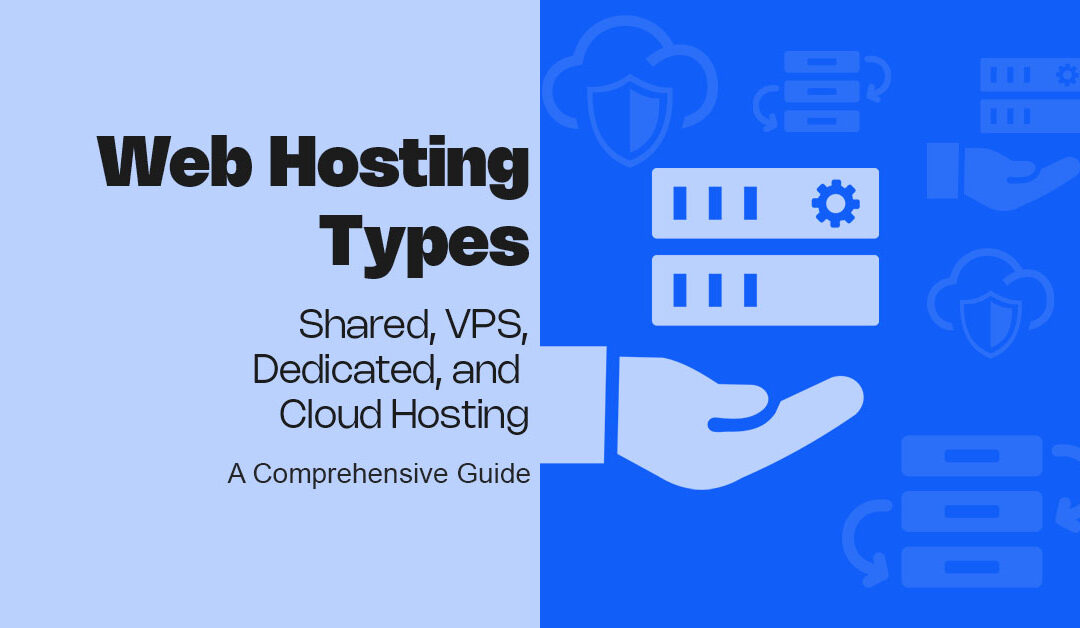When it comes to establishing an online presence, one of the crucial decisions you’ll have to make is choosing the right web hosting type for your website. Web hosting is the foundation upon which your website is built, and selecting the appropriate hosting type can significantly impact your website’s performance, security, and scalability. In this article, we will delve into the various web hosting types available, namely Shared Hosting, VPS Hosting, Dedicated Hosting, and Cloud Hosting, to help you make an informed decision for your web hosting needs. We’ll also emphasize the importance of selecting the right hosting type for SEO purposes.
Before we proceed further, we have a list of recommended hosting providers.
- DigitalOcean: DigitalOcean specializes in cloud hosting, offering scalable solutions for developers.
- Bluehost: Known for its reliability and WordPress-friendly hosting.
- IONOS (1&1): Offers a range of hosting solutions with a strong international presence.
- Hostinger: Known for its affordability and user-friendly hosting options.
- HostGator: Provides a variety of hosting plans with excellent customer support.
- Read our Full Recommended Hosting List
Shared Hosting
Shared Hosting is an excellent option for individuals and small businesses looking to establish a basic online presence. In this setup, multiple websites share the same server resources, such as CPU, RAM, and storage space. While this makes it an affordable choice, there are some drawbacks to consider.
Advantages:
- Cost-Effective: Shared hosting is budget-friendly, making it ideal for beginners or those with limited budgets.
- Ease of Use: Hosting providers usually manage server maintenance and updates, making it hassle-free for users.
- Resource Allocation: Basic resource allocation is sufficient for small websites and blogs.
Disadvantages:
- Limited Resources: Since resources are shared, your website’s performance can be affected by traffic spikes on other sites hosted on the same server.
- Security Concerns: Security vulnerabilities on one website can potentially impact others on the same server.
- Lack of Scalability: Shared hosting may not accommodate the growth of larger websites.
VPS Hosting (Virtual Private Server)
VPS Hosting bridges the gap between Shared and Dedicated Hosting. It offers dedicated resources within a shared environment by partitioning a physical server into multiple virtual servers.
Advantages:
- Dedicated Resources: Your website has dedicated resources, ensuring consistent performance.
- Root Access: You have more control over server settings and can install custom software.
- Scalability: VPS plans can be scaled up as your website grows.
Disadvantages:
- Cost: VPS hosting is more expensive than shared hosting but offers better performance.
- Technical Knowledge: Some technical expertise may be required to manage and configure the server.
Dedicated Hosting
Dedicated Hosting provides an entire server exclusively for your website. This option is suitable for large businesses or websites with high traffic and resource demands.
Advantages:
- Full Control: You have complete control over the server, allowing for extensive customization.
- High Performance: Dedicated servers offer unparalleled performance and reliability.
- Enhanced Security: Your website’s security is less vulnerable to external threats.
Disadvantages:
- Costly: Dedicated hosting is the most expensive option due to the exclusive use of server resources.
- Technical Expertise: Server management and maintenance require advanced technical knowledge.
Cloud Hosting
Cloud Hosting is a modern and highly scalable hosting solution that utilizes a network of virtual servers. Resources are allocated dynamically as needed, making it an excellent choice for businesses with fluctuating traffic.
Advantages:
- Scalability: Easily scale resources up or down based on your website’s traffic.
- High Uptime: Cloud hosting providers typically offer high uptime guarantees.
- Redundancy: Data is stored redundantly across multiple servers, enhancing reliability.
Disadvantages:
- Variable Costs: Costs can fluctuate based on resource usage, potentially making it challenging to predict monthly expenses.
- Complexity: Managing cloud infrastructure may require more technical expertise.
SEO Considerations
Selecting the right web hosting type can impact your website’s SEO performance. Here’s how:
- Page Loading Speed: Google considers page loading speed as a ranking factor. Shared hosting may slow down your website during traffic spikes, affecting user experience and SEO.
- Server Location: Hosting servers’ geographical location can affect website loading times. Choose a hosting provider with servers located near your target audience for faster loading times.
- Security: Strong security measures are essential for SEO. Dedicated hosting offers better security, reducing the risk of security breaches that could negatively impact SEO.
- Uptime: Google prefers websites with high uptime. Cloud hosting often provides better uptime guarantees, ensuring your website is available when needed.
In conclusion, selecting the right web hosting type is a crucial decision for your online presence. Consider your website’s size, traffic, technical expertise, and budget when making your choice. Ultimately, your hosting type can influence your website’s performance, security, and SEO rankings, so choose wisely to set a solid foundation for online success.
Remember, investing in the right hosting type is an investment in the long-term success of your website and online presence. So, analyze your needs carefully and make an informed decision when it comes to web hosting types.

